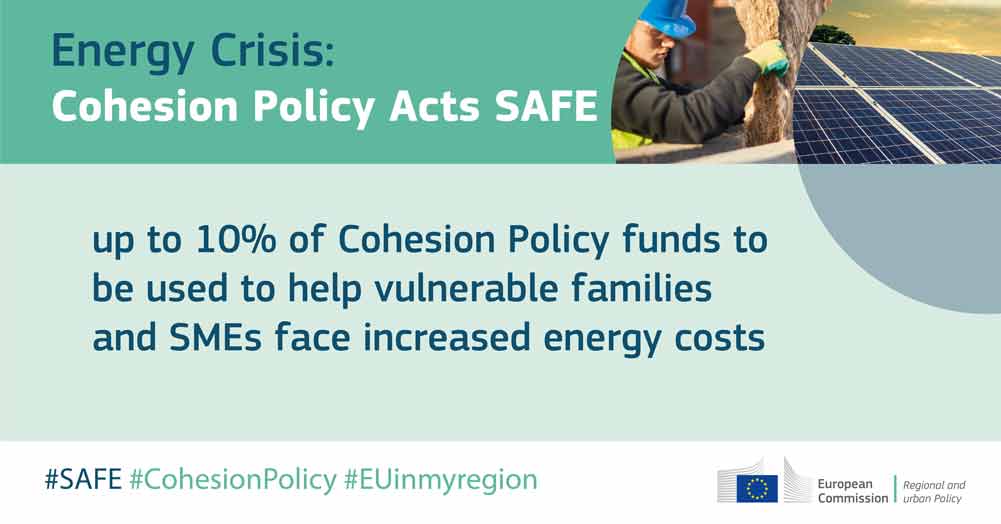Cohesion policy plays a major part in yesterday’s provisional agreement of the Council and the European Parliament on the RePowerEU proposal, which aims to end Europe’s energy dependence on Russia. RePowerEU aims at diversifying energy supplies and boosting the independence and security of the Union’s energy supply.
Cohesion policy is a key pillar supporting regions to tackle the consequences of the war in Ukraine
- 14 December 2022

Cohesion policy is a key pillar for RePowerEU and supports it in three areas:
- Support to vulnerable families, SMEs facing increased energy costs and workers by supporting short-term and equivalent work schemes thanks to SAFE (Supporting Affordable Energy), allowing Member States to use up to 10% of their 2014-2020 cohesion policy allocation for these purposes, with 100% EU co-financing.
- Long-term investments, including on the green transition, as Member States will have the possibility to implement under their 2021-2027 Cohesion Policy programmes up to 7.5% of their resources for REPowerEU objectives
- Member States have the possibility of voluntary transfers from the Brexit Adjustment Reserve (BAR) to increase the grants component of RePowerEU, which will be based on resources from the Innovation Fund (60%) and frontloading ETS allowances (40%).
As part of REPowerEU, SAFE is expected to be adopted and enter into force early 2023 at the latest.
€700 million as direct support to Ukrainian refugees thanks to CARE
Up to today, cohesion policy has already supported Ukrainian refugees through CARE via €700 million in direct assistance to the refugees and €7 billion in increased liquidity to the Member States’ budgets. Concretely, cohesion policy has supported Member States with food, basic material assistance, accommodation, transport, immediate healthcare as well as information and translation services.
Background
This year, the Commission adopted comprehensive packages of measures - known also as Cohesion’s Action for Refugees in Europe (CARE) and Flexible Assistance to Territories (FAST-CARE) - providing extensive flexibilities within Cohesion Policy to promptly help Member States and regions to address the consequences of Russia’s aggression against Ukraine.
The flexibilities introduced aim essentially at using the remaining 2014-2020 cohesion policy funds to support people fleeing Ukraine (with some targeted flexibilities for 2021-2027), while alleviating the financial burden of Member States, especially those that are most exposed to the refugee crisis.
Among others, these flexibilities include:
- Increased pre-financing, including for REACT-EU resources, which provides rapid liquidity to all Member States and simplified cost options to accelerate implementation of support for refugees
- The possibility of 100% co-financing to address migratory challenges, also for 2021-2027 programmes when measures aim at promoting the socio-economic integration of third country nationals.
- Ring-fence at least 30% of the financial allocation under relevant priorities to address migratory challenges for local authorities or civil society organisations as beneficiaries - given their active role in actions to welcome and integrate refugees.
